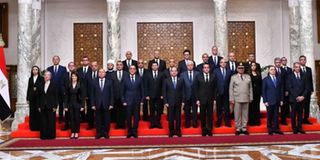Egypt overhauls cabinet as economic pressures, power cuts persist

Egyptian President Abdel Fattah al-Sisi poses for a group photo along with Egypt's new cabinet after the swears-in at Al-Ittihadiya presidential palace in Cairo, Egypt, July 3, 2024. in this handout picture courtesy of the Egyptian Presidency. The Egyptian Presidency/Handout via REUTERS
What you need to know:
When the resignation of the previous cabinet was announced a month ago, Sisi reappointed Prime Minister Mostafa Madbouly and said his new government should focus on lowering inflation that climbed to record levels last year and on boosting investment
Egyptian President Abdel Fattah al-Sisi swore in a heavily reshuffled cabinet on Wednesday that includes new finance and foreign ministers in a government facing challenges including the Gaza war on its border, economic woes and daily power cuts.
When the resignation of the previous cabinet was announced a month ago, Sisi reappointed Prime Minister Mostafa Madbouly and said his new government should focus on lowering inflation that climbed to record levels last year and on boosting investment.
The new finance minister is Ahmed Kouchouk, an established figure who has been a lead negotiator with the International Monetary Fund as deputy finance minister since 2016 and previously worked as an economist at the World Bank.
After being sworn in, Kouchouk said Egypt was committed to fiscal discipline and bringing down debt, as well as pursuing structural reform to allow for private sector growth.
Rania al-Mashat, former minister of international cooperation and tasked with raising development financing, was re-appointed with planning and economic development added to her portfolio. The revived post of investment minister was filled by Hassan El Khatib, who has held roles at the European Bank for Reconstruction and Development and has a background in finance.
Egypt's sovereign dollar bonds rallied earlier on Wednesday after news of the appointments was leaked, with the longer-dated maturities gaining the most.
GAS SHORTAGES
A recent influx of investment and funding from the UAE, the IMF, and the EU, among others, has eased a chronic foreign currency shortage in Egypt, though power cuts and gas shortages have since left businesses and citizens struggling.
Karim Badawi, a manager at oil services firm SLB, was appointed petroleum minister and said providing fuel to power stations would be a priority. At the electricity ministry, former public enterprises minister Mahmoud Esmat replaced Mohamed Shaker.
Sherif Farouk, who oversaw reforms to pension payments systems as chairman of Egypt Post, took over at the supply ministry, which manages wheat purchases.
Egypt is one of the world's biggest wheat importers, and Farouk will also manage a food subsidy programme that feeds more than 60 million people and is a target for reform.
As Egypt tried to manage a dollar crunch and high inflation over the past two years, there was speculation that Madbouly himself could be replaced.
Analysts and businesspeople say deep changes are needed to set Egypt's economy on a more stable footing, including the state and military ceding space for the private sector.
Institutions also need to enable sharply higher exports and tax revenue, and invest in human capital, Mahmoud Mohieldin, a former Egyptian investment minister, told the American Chamber of Commerce in Cairo on Monday.
"We need to have a plan from now, which is a new growth model, a new development model," he said.
MILITARY CHANGES
Ministers in Egypt have limited decision-making authority, with real power residing with the presidency, military and security services.
The new cabinet was sworn in on the 11th anniversary of the day when Sisi, then army chief, led the ousting of Egypt's first democratically elected president, Mohamed Mursi of the Muslim Brotherhood. Sisi has since presided over a sweeping crackdown on political dissent.
There were several changes to senior military positions, with General Abdel Majeed Saqr, former governor of Suez, appointed defence minister, and Lieutenant General Ahmed Fathy Khalifa replacing Lieutenant General Osama Askar as chief of staff.
At the foreign ministry, Egypt's ambassador to the European Union, Badr Abdelatty, took the place of Sameh Shoukry, a veteran who has steered Egypt's diplomatic efforts to contain the impact of the war in Gaza.




